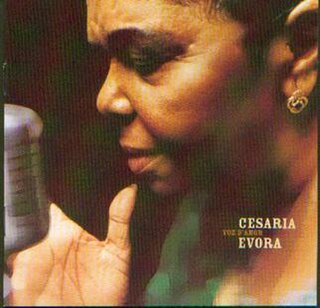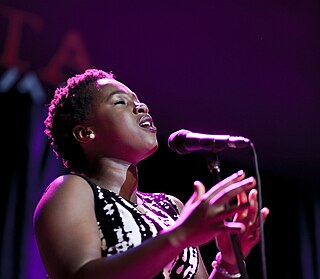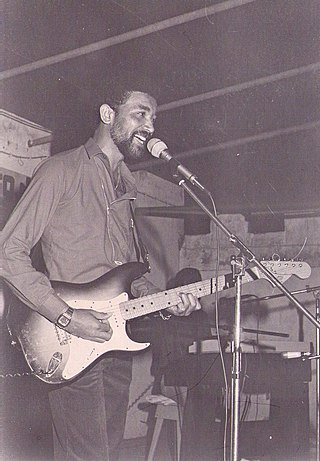Related Research Articles

Mindelo is a port city in the northern part of the island of São Vicente in Cape Verde. Mindelo is also the seat of the parish of Nossa Senhora da Luz, and the municipality of São Vicente. The city is home to 93% of the entire island's population. Mindelo is known for its colourful and animated carnival celebrations, with roots in Portuguese traditions later influenced by the Brazilian culture.

São Vicente is one of the Barlavento Islands, the northern group within the Cape Verde archipelago in the Atlantic Ocean, off the West African coast. It is located between the islands of Santo Antão and Santa Luzia, with the Canal de São Vicente separating it from Santo Antão.

Cape Verde is known internationally for morna, a form of folk music usually sung in the Cape Verdean Creole, accompanied by clarinet, violin, guitar and cavaquinho. Funaná, Coladeira, Batuque and Cabo love are other musical forms.

Manuel d' Novas was a Cape Verdean poet and composer.

Cesária ÉvoraGCIH was a Cape Verdean singer known for singing morna, a genre of music from Cape Verde, in her native Cape Verdean Creole. Her songs were often devoted to themes of love, homesickness, nostalgia, and the history of the Cape Verdean people. She was known for performing barefoot and for her habit of smoking and drinking on stage during intermissions. Évora's music has received many accolades, including a Grammy Award in 2004, and it has influenced many Cape Verde diaspora musicians as well as American pop singer Madonna. Évora is also known as Cizé, the Barefoot Diva, and the Queen of Morna.

Lesbian, gay, bisexual, and transgender (LGBT) people in Cape Verde are afforded some legal protections, and Cape Verde is considered a gay tolerant country. Homosexual activity has been legal in Cape Verde since 2004. Additionally, since 2008, employment discrimination on the basis of sexual orientation has been banned, making Cape Verde one of the few African countries to have such protections for LGBTQ people.

Voz d'Amor is the ninth album by Cesária Évora. The album reached number 3 in Poland, the first Cape Verdean and West African artist to reach the Polish Top 10 charts and number 2 in the Billboard 200 World Albums Chart. The album sold about 400,000 copies. In Switzerland, the album reached number 57 below the Top 50 charts in October and remained in the Swiss charts for six weeks.

Fantcha is a Cape Verdean singer.

Cape Verde or Cabo Verde, officially the Republic of Cabo Verde, is an archipelago and island country of West Africa in the central Atlantic Ocean, consisting of ten volcanic islands with a combined land area of about 4,033 square kilometres (1,557 sq mi). These islands lie between 600 and 850 kilometres west of Cap-Vert, the westernmost point of continental Africa. The Cape Verde islands form part of the Macaronesia ecoregion, along with the Azores, the Canary Islands, Madeira and the Savage Isles.
Teófilo Chantre is a Cape Verdean musician, first noted for his decades long collaboration with singer Cesaría Évora, and later for his own recordings.
Maria Alice may also refer to a Portuguese fadista
Cape Verde, in Portuguese Cabo Verde, is an island country in West Africa.

Tchindas is a 2015 Spanish-Cape Verdean documentary film directed by Pablo García Pérez de Lara and Marc Serena. The film premiered at the Outfest Los Angeles 2015 where it received a Grand Jury Award.
Francisco Xavier da Cruz, also known as B. Leza or Beleza was a Cape Verdean writer, composer and singer of morna music..

Epifânia de Freitas Silva Ramos Évora, better known as Dona Tututa or Tututa Évora was a Cape Verdean composer and a pianist.
Hermínia da Cruz Fortes, better known as Hermínia d'Antónia de Sal, was a Cape Verdean singer.

Elida Almeida is a Cape Verdean singer.

Djô d'Eloy born Adolfo de Jon Xalino was a Cape Verdean singer, composer and guitarist. He belonged to the Xalino family of singers. His greatest singles included "Arriola" and "Grandeza", both appeared in the album Nos Festa in 1981. he was of the Xalino family. His most famous singles were "Reanima" and "Celina". Alongside Bana, he was the founder of the nation's first music festival, the Baía das Gatas Music Festival.
The following lists events that happened during 2003 in Cape Verde.
Jenifer Solidade Almeida is a singer from Cape Verde.
References
- 1 2 3 Linden 2015.
- 1 2 3 4 Rodriguez Martinez 2021.
- 1 2 Linden 2015; Newell-Hanson 2016; Page 2016; Rodriguez Martinez 2021.
- 1 2 3 Newell-Hanson 2016; Rodriguez Martinez 2021.
- 1 2 3 4 5 6 Newell-Hanson 2016.
- 1 2 Linden 2015; Newell-Hanson 2016.
- 1 2 Page 2016.
- 1 2 Newell-Hanson 2016; Page 2016; Rodriguez Martinez 2021.
- ↑ Page 2016; Rodriguez Martinez 2021.